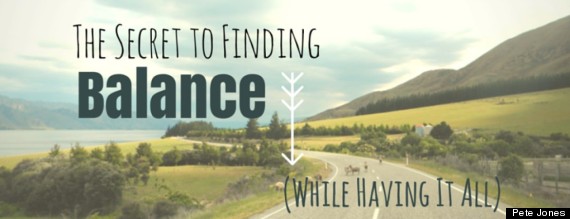
This post was originally published on Quarter For Your Crisis, an online community created to share stories of those who don't think normalcy is an option and who want to actually live and breathe their passions.
My parents wanted me to have everything. And in my oh-so-typical Millennial mindset, I tend to think that I really can have it all. By presenting a world of endless possibilities, my parents provided me with a wonderful childhood. I truly feel lucky to have the confidence to face the competition in fighting for success and embracing failure. Winning and having it all were that important to me. As I've spent time in the working world, I've thought more and more about what having it all means to me. I've come to a realization that I had to have someone else want more for me so that I understood competition in the path to getting what you want.
In actuality, while I am competitive, and want many many things for myself, the thing I want most is balance. To reach my balance, I had to learn to accept my strengths and weaknesses, to achieve self awareness (a work in progress), and to speak up for the things I wanted. Because balance, to me, is the ultimate success and happiness.
In Tiny Beautiful Things: Advice on Love and Life from Dear Sugar by Cheryl Strayed, columnist Dear Sugar delivers a quote to a struggling artist:
It was not until I had some really off-balance moments of depression, aggravation, and struggle that I started to realize that I wanted to strive for something better. I had to learn my limitations to figure out what I was okay with, vocalize them (even if it was only to myself at first), then figure out how to be my most successful, most happy, most balanced self. On that note, I began to realize that my balance didn't look like most of my peers. Everyone's point of balance is different -- you can't criticize or judge someone else's lifestyle if their balance doesn't look like your own. And believe me, it comes in rare forms. A colleague's desire to work 100 hours a week might work for them if their point of balance comes from attending morning mass. You shouldn't try to compare your balance to someone else's. Trying to force understanding can create jealousy ("how does she do it all?") as well an unnecessary stressor -- ultimately throwing you off your balance.
How do you learn your balance? The best answer I have is experience and time. When you have it good, you'll know. It may not be what you were expecting! For example, when I was volunteering over a 48-hour-no-sitting-no-sleeping weekend at Penn State's Dance Marathon, commonly known as THON, I felt eternal happiness and balance in knowing that I was spending my time exactly as I wanted to in that moment. To someone unfamiliar with the event, non stop action for 48 hours without sleep probably sounds dreadful but, when I felt the passion and connection to the cause, I didn't think twice about my decision to be in that moment. That's balance.
In consulting, I would travel every week to towns that I have no desire to return to for 6+ month long stretches at a time. When I traveled to a place where a client's issue struck a cord with me, engaged me to the point where I felt that I was helping this organization move forward, working with a team of supportive clients and super star consultants, I felt fulfilled, I felt balanced. Alternatively, there were times when I was engaged only for menial tasks, stifled by outrageous egos and pie in the sky expectations, and held to someone else's limitations and deadlines. To counter those moments, I would actively search for alternative means for a taste of balance: a runner's high, late night partying, spontaneous travel, fabulous restaurants, Netflix binges, and so on. Those experiences would help me feel short bursts of happiness but ultimately for me, they were not true balance.
Why not?
Ultimately because it wasn't sustainable. Brief escapes from reality are just that -- escapes! True balance shouldn't feel like that. Like a crash diet that ended in zero weight loss. The exasperated disappointment: "What do you mean I gained it back! All I ate and drank was juice for 3 days!"
A balanced life is mindful, conscious of decisions, living your life with purpose, happiness, and self worth. In Lean In, Sheryl Sandberg talks openly about NOT doing it all. You have to really know what you want and cut out all the rest. Define your boundaries, prioritize the things you want, and communicate your desires/goals/daily schedules to the people around you. No one's a mind reader. People will think you're just like them -- that you also want to work 100 hours a week to get the next promotion. You don't? Insert a bewildered expression here. I encourage you to figure out what works for you, test the boundaries, and not to put all your eggs in one basket.
If you love your work to the point that it feels like play, that might be your balance. You will have to make sacrifices from time to time. You will feel days that you feel "off" but, if you know what balance is, you will be able to build a plan to get back to that point.